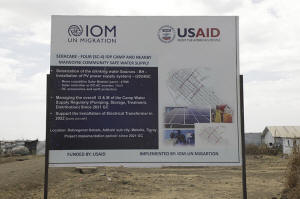'We will just die in silence': US aid cuts hit Ethiopia's fragile Tigray
region
[March 13, 2025]
By SAMUEL GETACHEW and FRED HARTER
MEKELE, Ethiopia (AP) — As a displaced person in Ethiopia’s northern
Tigray region, 76-year-old Haile Tsege is no stranger to hunger.
During its war with Tigray fighters that devastated the region in
2020-2022, Ethiopian government restrictions on the rebellious region
reduced aid flows to a trickle. Then in 2023, U.S. and U.N. aid
distributions of grain were halted for months over a corruption scandal.
Now the Trump administration’s dismantling of the U.S. Agency for
International Development, or USAID, has again halted food deliveries to
a sprawling camp of over 20,000 people outside Tigray’s regional
capital, Mekele.
“We will just die in silence,” said Tsege, one of the 2.4 million people
in Tigray who depend on humanitarian grain, most of it provided by the
U.S.
Ethiopia with its over 125 million people had been the biggest
beneficiary of U.S. aid in sub-Saharan Africa, receiving $1.8 billion in
the 2023 financial year. In addition to life-saving food, the funds were
spent on HIV medications, vaccines, literacy programs and jobs creation,
as well as services for 1 million refugees hosted by Ethiopia.
Most of these programs have been stopped. The USAID staffers who oversaw
them have been placed on administrative leave and told not to work, as
they face the threat of termination. The U.S. Embassy didn't respond to
questions.
Emergency food was exempted from President Donald Trump’s executive
order, signed on his first day in office, suspending foreign aid during
a 90-day review amid the administration's allegations of waste.

Aid agencies in Ethiopia had to apply to USAID for waivers to continue
handing out U.S. grain. These have been secured, but USAID’s payments
system is still not functioning.
As a result, a consortium of aid agencies in Tigray has had to stop
distributions to the over 1 million people it has been responsible for
feeding with U.S.-provided grain. It has no money to pay for fuel,
trucks and drivers to distribute existing food stockpiles.
That includes 5,000 metric tons of sorghum – enough to feed 300,000
people for a month – stuck in a storage facility in Mekele that could
rot before it reaches those in need.
“This is just one warehouse. There are several others across the
region,” said Teklewoini Assefa, head of the Relief Society of Tigray,
part of the consortium. “This will create malnutrition, disease. If this
situation continues, what follows? Death.”
He added: “Everything boils down to the payment system.”
The effects of the aid cuts are widespread, with many USAID contracts
terminated. Already, Ethiopia has been forced to lay off 5,000 local
healthcare workers who were working on its HIV response.
Tigray relied heavily on U.S. funds. More than two years after the war
killed hundreds of thousands, full-scale recovery efforts are yet to
start. The region’s health system is in ruins and hundreds of schools
remain closed.
[to top of second column]
|

A sign reading 'USAID' stands at the entrance of the Sebacare
internally displaced persons (IDPs) camp, on the outskirts of Mekele,
Tigray region, Ethiopia, Wednesday, Feb. 12, 2025. (AP
Photo/Alexander Mamo)
 In 2024, child malnutrition stood at
21% in some areas, according to a survey reviewed by The Associated
Press — far above the World Health Organization’s threshold of 15%
at which a situation is classified as an emergency.
Now, aid workers say many programs to improve nutrition have halted.
Projects to deliver medicines and vaccines have stopped. Dozens of
camps for displaced people have had water sources cut off.
“The impact has been huge,” said Ashenafi Asmelash, executive
director of Mums for Mums, which has had two USAID- funded programs
terminated. One helped build long-term resilience among farmers. The
other helped improve the nutrition of children and new mothers.
Management Sciences for Health, another Tigray organization, has
halted a project to combat tuberculosis and told its staff to expect
mass layoffs in March, according to a senior executive, who spoke on
condition of anonymity for fear of reprisals.
Efforts to assist thousands of women who were raped during the war
have been derailed, said Rigat Bishaw at Ayder Hospital, Tigray’s
biggest healthcare facility.
This includes counseling and physiotherapy sessions for survivors
run by the U.S.-based Center for Victims of Torture, which received
a stop-work order from the Trump administration in February and
furloughed its staff.
CVT also halted a program to train health workers to recognize
sexual abuse cases and refer survivors to appropriate health
services.
“This sudden disruption is having a huge impact on the healing of
traumatized people,” said Yohannes Fisseha, a CVT manager.
Major projects to support people living with HIV, improve access to
life-saving nutrition services and improve relations between
war-affected communities have also been cut off, said Yirga
Gebregziabher, the Tigray branch manager of an Ethiopian
organization called OSSHD, which helped implement the projects.

The organization has been forced to fire dozens of expert staff.
“Our picture of America was as a protector of rights, a positive
force in the world,” Yigra said. “That image has now been broken. If
there was a process, maybe the shock would have been less. But there
was no consultation, no engagement.”
All contents © copyright 2025 Associated Press. All rights reserved |